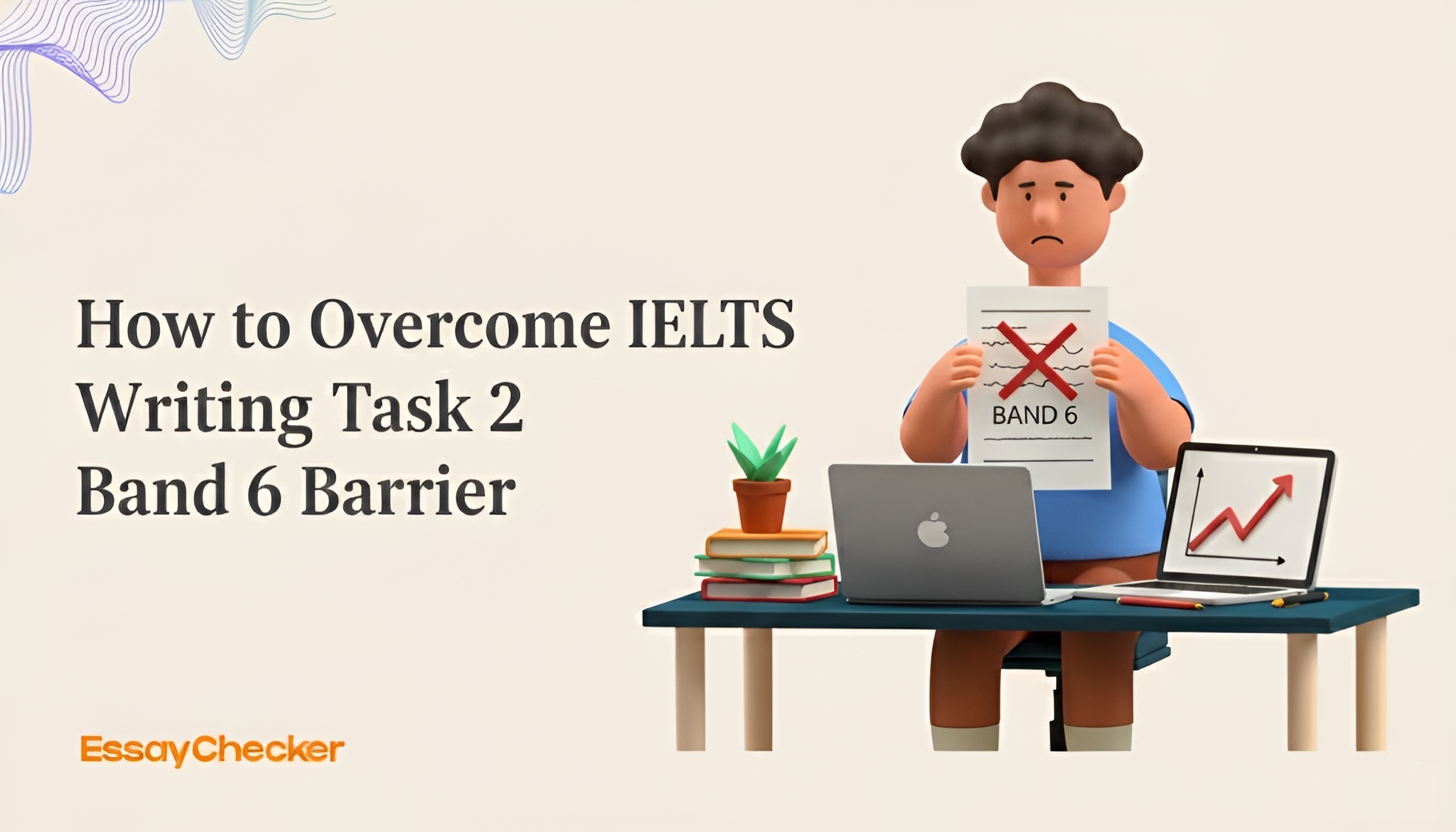Stuck at Band 6 in IELTS Writing?

If you’ve been preparing for the IELTS exam and consistently find yourself stuck at Band 6 in Writing Task 2, you’re not alone. Thousands of test-takers,especially students in Canada, the UK, and Australia,struggle to move beyond this score.
But the good news is: Band 6 is not the end of the road. With the right strategies, you can move from Band 6 to Band 6.5 or even Band 7.
In this article, we’ll explore:
- Why students often get “stuck” at Band 6.
- The most common writing mistakes that stop progress.
- Step-by-step strategies to improve.
- How to use tools like EssayChecker IELTS Writing Task 2 Feedback and study planners to accelerate your learning.
Let’s dive in.
Understanding the IELTS Band Descriptors
Before we solve the problem, let’s look at what Band 6 really means. IELTS examiners score your Writing Task 2 essays using four descriptors:
- Task Achievement – Did you answer the question fully and clearly?
- Coherence and Cohesion – Is your essay logically structured and easy to follow?
- Lexical Resource – Are you using a wide range of vocabulary appropriately?
- Grammatical Range and Accuracy – Do you use correct grammar and varied sentence structures?
👉 A Band 6 typically means:
- Your essay answers the question partially, but not fully.
- Paragraphs are not always logically connected.
- Vocabulary is limited or repetitive.
- Frequent grammar mistakes reduce clarity.
This is why many students remain “stuck” at this level: they think writing more words or using advanced vocabulary alone will push them up, but in reality, balance across all four areas is required.
The Top 5 Reasons You’re Stuck at Band 6 in IELTS Writing
1. Not Fully Addressing the Question
Many students go off-topic or write a memorized essay. IELTS examiners want direct, relevant answers. For example, if the question asks:
"Some people think international tourism creates tension rather than understanding. Discuss both views and give your opinion."
A Band 6 student might:
- Only discuss one side.
- Forget to give their own opinion.
2. Weak Essay Structure
Examiners look for a clear structure:
- Introduction
- 2–3 Body Paragraphs
- Conclusion
If your ideas are scattered or paragraphs don’t flow, your coherence score drops.
3. Repetitive Vocabulary
Band 6 students often repeat the same words like “good,” “bad,” “important.” To move higher, you must show range and precision in vocabulary.
4. Grammar Errors
Frequent mistakes in verb tense, articles (“a, an, the”), and subject-verb agreement signal Band 6. Occasional mistakes are fine, but too many reduce clarity.
5. No Practice Under Exam Conditions
Writing essays without timing yourself is a common trap. IELTS requires you to finish Task 2 in 40 minutes. Many Band 6 students either:
- Run out of time.
- Fail to review their essay.
Step-by-Step Plan to Move from Band 6 to Band 6.5+
Now that we know why students are stuck, let’s look at how to improve.
Step 1: Analyze Your Writing With Feedback
Self-study is important, but you need feedback to know where you’re losing marks. Tools like EssayChecker IELTS Task 2 Feedback provide instant evaluation on task achievement, grammar, coherence, and vocabulary.
Step 2: Master IELTS Essay Structures
Memorize flexible templates for:
- Opinion essays
- Discussion essays
- Problem-solution essays
- Advantages/disadvantages essays
This ensures your essay is always well-organized.
Step 3: Expand Vocabulary for IELTS
Create a list of topic-specific vocabulary (environment, technology, health, education). Use synonyms and collocations naturally. For example:
- Instead of “big problem” → “pressing issue.”
- Instead of “good for society” → “beneficial to the community.”
Step 4: Improve Grammar Accuracy
Focus on the most common errors:
- Articles: “The environment” not “environment.”
- Tense consistency: If you start in present tense, don’t switch unnecessarily.
- Complex sentences: Use linking words like “although,” “whereas,” and “in addition.”
Step 5: Practice Under Real Test Conditions
Use a timer: 40 minutes per essay. After writing, spend 5 minutes reviewing for spelling and grammar errors.
You can practice mock test under timed conditions here: EssayChecker Mock Test
Step 6: Use a Study Planner
Consistency is key. A structured plan like our IELTS 2-week and 3-week study planners keeps you disciplined. You can check them out here: 👉 Download IELTS Study Planner
Sample Band 6 vs Band 7 Comparison
Band 6 Essay (common errors):
“People like to travel to other countries but it can make conflicts because of different culture. In my opinion, it is good to travel because people learn.”
Problems:
- Grammar errors (“make conflicts,” “different culture”).
- Ideas not fully developed.
- Vocabulary is too simple.
Improved Band 7 Essay:
“Although international tourism sometimes leads to cultural misunderstandings, it is generally beneficial because it fosters global awareness and mutual respect. In my view, the advantages of exposure to diverse traditions outweigh the drawbacks.”
Strengths:
- Balanced view.
- Sophisticated vocabulary (“fosters global awareness,” “mutual respect”).
- Clear opinion.
Practical Daily Routine for Band 6 Writers
- Day 1–5: Focus on essay structures (write one essay type per day).
- Day 6–10: Vocabulary building + timed practice.
- Day 11–15: Grammar drills and sentence variation.
- Day 16–20: Full timed mock tests with feedback.
Use the EssayChecker tool after each essay to track improvement.
FAQs About IELTS Writing Band 6
1. Why am I stuck at Band 6 in IELTS writing?
Because your essay likely has weaknesses in grammar, coherence, or task achievement. You must balance all four scoring criteria.
2. Is Band 6 enough for immigration?
For Canada immigration (CLB 7), you usually need at least Band 6.0 in each section, but some programs require 6.5 or higher in writing.
3. How can I improve grammar for IELTS Writing?
Focus on articles, verb tenses, and sentence variety. Practice daily and get feedback.
4. What vocabulary is required for Band 7?
You need topic-specific vocabulary (health, environment, education) and the ability to use synonyms naturally.
5. Should I write longer essays to score higher?
No. Word count matters (at least 250 words), but quality is more important than length. Overwriting often leads to more mistakes.
6. What’s the fastest way to move from Band 6 to Band 7?
Use structured practice with a study planner and tools like EssayChecker Writing Feedback. Consistency beats cramming.
Final Thoughts
Getting stuck at Band 6 in IELTS Writing Task 2 is frustrating, but it’s also a sign that you’re close to breaking through. By focusing on essay structure, grammar accuracy, vocabulary range, and real test practice, you can move up to Band 6.5 or 7.
Remember:
- Practice smart, not just hard.
- Use EssayChecker’s Writing Feedback Tool for instant evaluation.
- Stay consistent with a dedicated IELTS study planner.
👉 With the right strategies, your Band 6 can become Band 7+, and open the doors to study, work, or immigration abroad.
For any queries, don't hesitate to reach us at help@essaychecker.ai
Thank you,
Team EssayChecker
